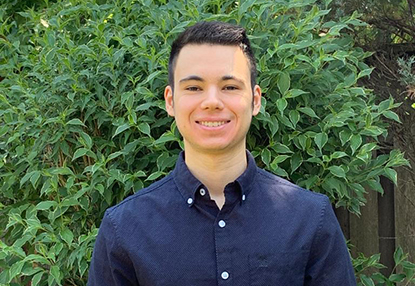Feature: Trailblazing student wins gold
By Crystal Mackay, MA'05
The term ‘synthetic biology’ may at first seem like an oxymoron. How can biology - the natural science of life and living organisms - be synthetic? But, in fact, synthetic biology is exactly that; it is an emerging field of science that involves reengineering and synthesizing naturally-occurring organisms to give them new purpose.
 For Daniel Nucifora, the first graduate of the Honours Specialization in Synthetic Biology, this ability to manipulate biology has become a passion.
For Daniel Nucifora, the first graduate of the Honours Specialization in Synthetic Biology, this ability to manipulate biology has become a passion.
“I love how it is the crossroads between different disciplines; it brings together genetics, biochemistry and cell biology,” he said. “And I like being able to manipulate these things into something that serves a useful purpose.”
The Synthetic Biology module, introduced in September 2019, is a partnership between Schulich Medicine & Dentistry and the Faculty of Science. The program builds on established research excellence in the field at Western.
“When I was in second year, I learned about the foundations of molecular biology, which was really cool, but I was fascinated by the fact that it could also be manipulated,” Nucifora said. “When I heard about the program in synthetic biology, I decided to take a leap of faith and jump on it as soon as I got the chance.”
With a keen interest in the field, Nucifora was able to accelerate the completion of the program requirements and graduated with a Western Gold Medal for outstanding academic achievement.
The program includes a fourth-year course where students are able to dive right into a research project in the lab in order to implement an original idea. Nucifora developed a yeast-based biosensor that could detect estrogen in wastewater.
“This is important to test because a lot of facilities don’t even know if they are able to break down estrogen completely, and so they could have these detectable, physiologically relevant concentrations of this hormone leaving their facilities without them even knowing it,” he said.
Estrogen is considered an emerging contaminant. It can be eliminated in waste water facilities to some extent, but small, detectable amounts may still be leaving the facilities and entering the environment where they can accumulate.
Nucifora’s project involved finding a genetic element that is triggered when it binds to estrogen, and makes yeast respond to estrogen in the environment. In this way, he was able to take two unrelated parts that function independently in biology, and combine them into a system that serves a useful purpose.
The idea came as part of his involvement in Western’s iGEM team. The International Genetically Engineered Machine Foundation is an independent, non-profit organization dedicated the advancement of synthetic biology through education and competition.
The team at Western competes at the world’s largest synthetic biology competition, and their 2020 project focuses on creating biofilms and biosensors to manage contaminants in wastewater.
Nucifora is excited by the fact that many synthetic biology applications centre on helping the environment. Synthetic biologists might modify plant cells so they can fix their own nitrogen, eliminating the need for fertilizer, for example, or reengineer crops to be more resistant to drought or pests.
“A lot of the potential for synthetic biology lies in the space of bioremediation. So, with this technology, we can improve things to make them friendlier for the earth,” Nucifora said.
Next, the new graduate will be doing a direct-entry PhD in Biochemistry supervised by Bogumil Karas, PhD, starting in September.
“When I saw how dedicated Daniel was to synthetic biology research, and his excellent academic standing in his final year, it was clear to me that he was a great candidate for direct entry to the PhD program,” said Karas.








